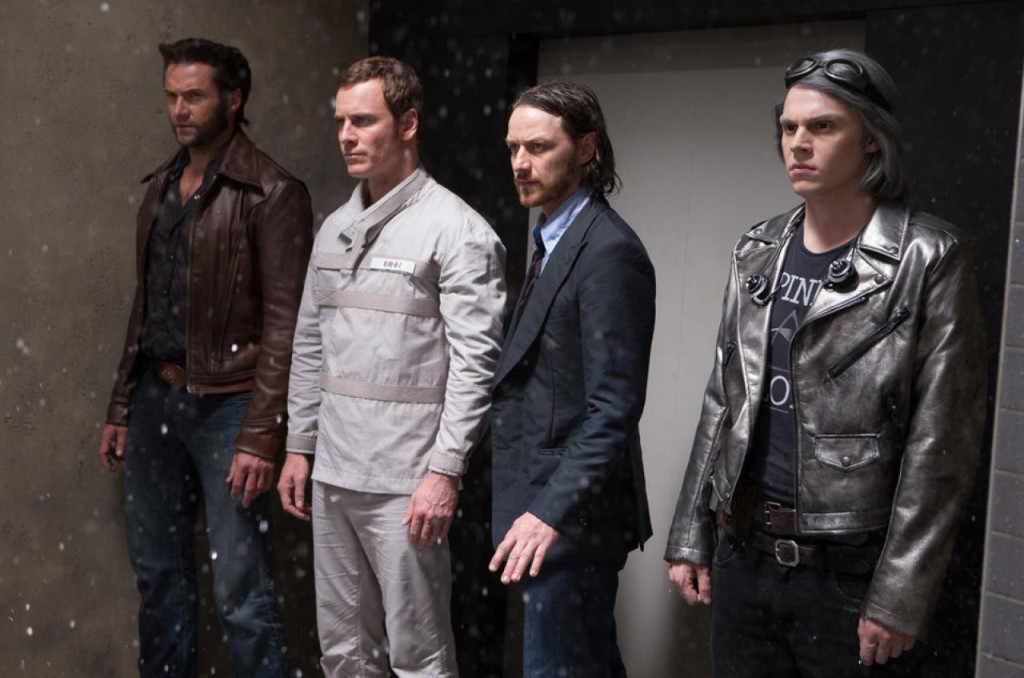You heard me. Last week, my brother came to town and stayed with us. So instead of sitting down with that pile of comics I had you all vote on (and believe me, everyone’s comments made for great reading for me: that was clearly the greatest admission of defeat I’ve ever made (and believe me, I’ve made plenty)), we went to the Pinball Museum in Alameda, and Great America down in Santa Clara, and saw movies. I read an issue and a half of Prez–because, come on, it’s Prez!–but that’s about it.
But, in true 21st Century fashion, I am not acknowledging failure, I am pivoting to a point of strength. Between the movies I saw this week, and the few I’ve caught over the last month or so, I figured that rather than inflicting upon you hasty, ill-conceived capsule reviews of comics, I could lavish you with les petit cadeaux of cinematic insight. (Just kidding: they’re also hasty and ill-conceived.)
X-MEN: DAYS OF FUTURE PAST (2014): I don’t know if it’s just me being an old fart or generally indecisive, but I think I’ve watched more movies on the HBO app in six months than I have in the past eighteen on Netflix where, even as I bemoan the preponderance of TV shows, I nevertheless watch way more episodic TV than standalone flicks. There’s something about a much smaller list of rotating films (as opposed to Netflix’s increasingly disingenuous “because you liked Tarkovsky’s Solaris, we recommend Unbreakable Kimmy Schmidt!” approach) I find much easier to access. Or maybe it’s just that HBO has the lock on recent bigger budget films I was too lazy to see in the theater?
And, in fact, Days of Future Past was indeed the first of the five X-Men movies I didn’t see when it was out, though not (purely) from laziness. No, as the the run-up to this film’s theatrical release unraveled into a P.R. nightmare, I realized that although I’d seen all the other X-Men movies, I hadn’t really enjoyed any of them overall, only scattered bits here and there.
And although neither of Singer’s first two contributions to the series were the inept shitshow X-Men: The Last Stand had been, they’ve grown moribund in my memory. Singer cops everything I find most odious about Steven Spielberg—syrupy lighting, melodramatic soundtrack, the pouting of paper-thin characters; it’s as if Singer’s favorite Spielberg film was the “Kick The Can” segment of Twilight Zone: The Movie—without bringing any of the guy’s intellectual rigor to the material. (SS may be a greedy panderer who sold out his ridiculously comprehensive talents for dollars and popularity, but he’s still scarily good at running wires of subtext through his movies and grounding them to a zeitgeist that often hasn’t even manifested before production.)
By contrast, it’s not like Singer is a real-life Senor Spielbergo–although I wish he was because that bit is twenty years old and it still makes me laugh–but his thematic concerns are painfully obvious, at best fringed with irony but frequently something flat and leaden. X-Men: First Class had been largely dull, but at least dull in a randy way, as if director Matthew Vaughn was a one-man fanfic community, unable to decide which pairing he shipped the most. If Vaughn had been onboard for Days of Future Past, I might have shown up for a bargain matinee. But, no.
Anyway. It was on HBO and the missus was agreeable. And…yup. Turgid and mostly dull. Way too much fan service. Too many characters given no motivation other than “hey, you are about to die.” Michael Fassbender being clearly pissed about having to do green screen work. James McAvoy selling his character’s thin and contrived situation through sheer talent alone. Hugh Jackman continuing to overdo his workout routine to the point where he looks like a man who’s replaced all the major veins in his body with Silly Straws. A truly abysmal treatment of Jennifer Lawrence and her character by making the corruptibility of Mystique’s soul the movie’s mcguffin which it then discards (along with the character) literally two minutes after she fulfills her part of the plot. (I won’t even bore you with the historical inaccuracies and the way that moving the story back to the ’70s borks the tone of the Claremont/Byrne original: all that is part and parcel of making this movie bridge the two franchises.)
I know the big, seemingly endless action setpieces of today’s movies are an attempt to present something that demands to be seen on the big screen, but at this point it almost feels more like a genuine self-expression from this generation of big time Hollywood filmmakers: obsessive workaholics, they might really believe the purest expression of character is all that doing, all the dashing around, all that causing of explosions. If they really believed people could simply care about other people for who they were, would the filmmakers have been able to risen to the top of Hollywood?
Having said all of the above, I would be remiss if I didn’t point out that Singer consistently frames his shots in interesting ways that made this pretty watchable in a minute-by-minute kind of way. And as many, many people have noted before me, his scene with Quicksilver is a perfect little gem, one that shows how good Singer can be with music when he’s not laying on the faux-John Williams “ta-da-DUMP-duh-da! (blatz, blatz!)” soundtrack. (I thought his usage of Roberta Flack’s “The First Time Ever I Saw Your Face” was also quite good.)
And for a dude who always sets his cruise control to “leaden sense of wonder,” Singer can share Spielberg’s sly sense of wit (or at least won’t smother it outright), as when Magneto insists that JFK was a mutant or the Beast boasts that he’s set up a control room where he can monitor all three networks and PBS.
Overall, it wasn’t as bad as James Mangold’s The Wolverine—and jesus, James Mangold, there’s a guy whose entire filmography is going to be used by future generations to epitomize the word “turgid”—but that’s a little bit like saying hitting your funny bone isn’t as bad as having one of those Amazon penis fish swim up your urethra. (In case you can’t pick up what I’m laying down: The Wolverine was really bad, you guys.)
MAD MAX: FURY ROAD (2015): I finally caught a screening of this, months after watching the trailer and declaring, “I will see that opening day!” And despite seeing it in a theater so dingy my brother and I are still trying to figure out how they got scratches on a digital filmprint, I did indeed adore it. It’s action-packed and visually dazzling and jammed with gorgeous practical effects (though I admit my eyes were easily fooled).
It’s strange to see Miller return after such a long absence from a franchise he created and absolutely nail it—I was a little bit worried this would be his Phantom Menace, or his Escape from L.A.—although I think it helped that he had a take on it that scratched his joyously nihilist itch while also rubbing his humanist belly.
Consequently, it felt like there was a lot of Sergio Leone in this (a dude who also tried to temper his talent his portrait for amoral action pictures with his larger political concerns), but some of that is also down to setpieces like the fight between Furiosa, Max, the brides, and Nux, which takes the kind of jockeying for advantage you see in a Leone western and pushes it to somewhere between a Jackie Chan fight and a Three Stooges routine.
It also helps Miller is so willing to integrate stuff from those he influenced. I find it almost impossible to believe he hasn’t spent some time at Burning Man—where a real-life honest-to-god Thunderdome has been a staple for years—what with Fury Road’s flaming guitar being kissing cousins to Black Rock City’s famous flaming tuba.
Even better, Miller collaborated closely on Fury Road with comics powerhouse Brendan McCarthy, who’s talked about how much a fan he was of the Mad Max movies. In so many ways, Fury Road‘s mix of dour dystopia and lushly deranged visuals make it a 2000 AD movie Dredd was only able to dream of being: even now, I can think back on the movie and imagine it in five page episodes.
One thing that I find really interesting (and frankly pretty sad) is that the movie has done pretty lackluster box office here in the U.S. (Jurassic World made nearly as much in its second weekend alone as Fury Road’s entire domestic gross to date.) Maybe that’s because so many of the fans of the original movie are my age or older (and therefore will be super-glad to watch it when it hits their HBO app eleven months from now), but I would’ve thought an over-the-top car movie in the age of The Fast And The Furious franchise could’ve charted much higher here in the U.S., even with its dystopic premise (which of course hasn’t hurt The Hunger Games movies at all).
Maybe it was a marketing thing, but I also wonder if it’s because American audiences are deeply uncomfortable with “pure cinema,” movies that are so assured in their visual storytelling dialogue is minimal or non-existent. So many American action films come slathered in talk mayo, which I always chalked up to the filmmakers trying to convince themselves they’re making something important but now I’m wondering if all the breathlesslly dunderheaded chatter in a Transformers movie is there because dudes like Bay are aware of precisely how antsy American movie viewers can get if there’s not a steady stream of mouth noises.
Anyway, Mad Max: Fury Road. Entirely worth catching if you still can—and, again, if you’re an old school 2000 AD fan, I’d say it’s almost mandatory viewing.
INSIDE OUT (2015): For whatever reason, I’m largely indifferent to Pixar—out of their fifteen full-length films, I’ve seen nine (a surprise as I would’ve put the number around six)—which is a little bit like saying I’m indifferent to gold, or sunshine, or food.
Nonetheless, although I quite enjoyed it, I find it a little weird how everyone is talking about how crazily original the movie is. The film’s structure yoinks most of its moves right from the original Toy Story: a child’s adoring caretaker finally learns how to share the child with her opposite number after the two of them get knocked outside their comfort zone. It really shouldn’t be a point against Pixar for re-using a formula they perfected, but I really don’t really see why they should get a lot of credit for originality, either
Honestly, what Inside Out has going for it is how well it takes its premise and fleshes it out—not so much the idea of a group of emotions running a person (which only kinda of half-worked for me) but how it uses that as a jumping-off point to conceptualize our internal lives. What other animated movies would use as an entire premise for an animated film—the caves of the subconscious, or the movie studio where dreams were made, the nearly forgotten imaginary friend wandering around the backwoods of a person’s brain—Inside Out throws it all in, a type of generosity that also ensures nothing gets overworked. And because Pixar is so ridiculously good about marrying its premise to its setting to its structure, the whole thing frequently feels like a rich, dizzying skylark rather than a feature working overtime to distract you from the frailty of its central conceit.
In a way, it’s a bit like Mad Max: Fury Road: both films are so confident and generous in their worldbuilding, complaining about the weaknesses in either feels more than a little churlish. And while churlish is my middle name, it is nice to see two summer films that don’t have the stink of formulaic torpor to them. It’s exactly the kind of thing that makes me more willing to get off the couch.






The lack of Max getting a warmer reception in the U.S. can, sadly, be tied to the misogynist / gamergit backlash. There was an anti-feminist smear campaign against the film. There were also a lot of twits, like this alleged “reporter” at Cannes:
http://www.eonline.com/news/660859/tom-hardy-has-the-perfect-reaction-when-asked-if-mad-max-fury-road-should-be-a-man-s-movie-watch-now
I’m quite glad you got a kick out of it. I’ve only managed to convince two of my friends to see Fury Road but believe they’ll nudge their friends into it.
Oh right, that whole g-gate thng! As soon as you mentioned it, I remembered that had been a thing. That would be really sad if that had moved the dial more than the slightest sliver. (It’s sad that it helped at all, of course.)
Thinking about it, it’s also kind of a shame Fury Road got a summer release—the 2-D screenings are already disappearing around here, making it harder to for any word of mouth to build up and go anywhere. It might’ve worked a little bit better as very late summer release where it could’ve hung around for longer to cash in on its buzz.
That is a bummer, though I doubt the “men’s movement” morons had any serious effect. Pretty excellent film, though, just a step behind Road Warrior in the canon. And that shot of the sandstorm sweeping in was one of the most epic, glorious things I’ve seen in a recent film.
I really doubt that gamergate opposition would move the dial even a little bit.
I’ve seen Fury Road twice with two different groups of people (family, then friends), and I have to say based on these experiences that Jeff’s take is right on as to why this movie has failed to set the box office on chromium electric guitar fire. The lack of dialogue and traditional plot structure makes viewers uncomfortable.
A friend of mine had only one comment on Fury Road. He said, “They went from A, to B, to A again.” He isn’t wrong, of course, but I got the impression he didn’t get much out of the movie. Action movies are supposed to constantly tell you what’s going on and what they’re about*, or so we’re conditioned to believe.
*Case in point: See You Again from Fast7 has been #1 on Billboard for months now; the lyrics are “How can we not talk about family when family’s all we got?”, literally announcing the themes of the movie.
The only thing “holding back” Mad Max is it’s R-Rating, and it still has made more money than other recent R-rated hits like District 9, Magic Mike, The Wolf of Wall Street, The Departed, and 21-Jump Street. It’s currently the second highest grossing R-Rated movie of the year behind only Fifty Shades of Grey and ranks 43rd all-time. It might not be a “hit” in relation to cost, but by any other standard it’s a hit.
That’s an excellent point, B: it certainly did much better than, say, Chappie. Thanks!